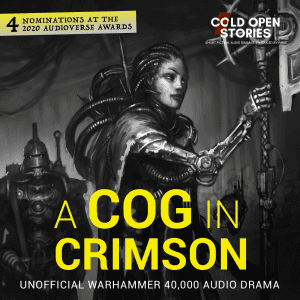Genetor Reus stalked down the line of white-shrouded wounded lying on the floor, an exhaust cloud of servitors trailing in his wake. At the foot of each man he paused. A manipulator arm chugged greasily and plucked aside the shroud. Reus regarded each form from behind black glass goggles, consulted with his cogitator, and passed judgement: ‘Incineration … incineration … incineration …’
After each pronunciation, pair of servitors shambled forward, grabbed the limp form by feet and arms, ignoring feeble cries, then carried it like an offering towards the waiting furnaces.
At the end of the line a handful Skitarii clumped around one of the bodies. The sheet was dalmatian-splattered with black handprints.
‘What are you doing?’ Reus demanded.
‘He saved us,’ one of the Skitarii replied. ‘He was the best of us — devout, brave, fearless.’
‘Can’t you do anything?’ another pleaded.
The Genetor’s mechanical arm dipped and lifted the sheet. The wounds were hideous, a blasphemy against nature. Black skin cracked like lava crust, revealing skin red with outrage.
‘Ork flamer,’ said the second Skitarii.
Reus bent his ear to the cogitator’s whisperings. The dying hero’s reflection writhed in his goggles.
‘He is in Omnissiah’s hands now,’ the Genetor said finally. He beckoned and murmured to the servitors: ‘Ruststalker.’
They carried the man down, down into the bowels of the planet.
Metalica was a forge world, made not of rock and stone but of machinery, a million, million foundries and factories and refineries, all guided by the calculations of the great cogitators deep beneath the surface, the voices of the God the Cult Mechanicus believed lived within all machinery.
The procession halted at a door. To one side was an obsidian plate, inscribed with the words: Material Repurposing.
The Genetor and servitors carried the moaning form inside. In the centre was a horizontal steel slab. Saws, needles and drills hung over it from metal stalactite arms. There were drains in the floor, their edges crusted in reddish-brown. A team of artisans stood about the table, looking at the Genetor expectantly.
‘Ruststalker,’ Reus said, as his two servitors dumped the body without ceremony upon the slab.
The body whispered, thin and weak, ‘Please…’
‘Cheer up, sonny,’ the chief artisan grinned. ‘Lucky devil, you’ll soon be a twin-bladed terror of the battlefield.’ He nodded to the Genetor. ‘Looks easy enough. Hack the leg stumps off, stick a pair of iron lungs in, full head and chest encasement, pair of transonic blades on the hands, be back on his feet before you can say “Glory to the Omnissiah.”‘
Reus nodded once, curtly, turned about and left the room. The door slammed on the keening of high-speed saws and faint, pathetic screams.
The transformation of mortally wounded man into cybernetic assassin took four hours.
The alarms began to ring five minutes later.
Reus burst back into the room, skidded and nearly fell, saved only by this manipulator limb grabbing the door frame. He looked down and saw what had slid under his boot’s tread: It looked like someone’s liver.
Bits of the material repurposing team were strewn about the floor with abandon. The carnage was not limited to the floor — purplish lumps ran slowly down the walls, and the ceiling had become a pointillist study in crimson. In the centre of the room, the chief artisan’s head had been spiked to one of the manipulator arms, still grinning. Of the newly-minted ruststalker there was no sign, save the fleshy souvenirs it had left behind.
All this, however, was not what made the Genetor’s breath whistle through his breathing mask in shock. No, he goggled in amazement instead at what had been done to the precious, precious machinery. Smashed. Disembowelled. Wiring and cable guts spilled from great rents in their casing.
‘Heresy,’ Reus whispered. ‘Sacrilege.’
A squawk from his wrist-vox intruded: ‘–Leximechanic Brevis, cogitator processing station four, a ruststalker is going berser –’ The voice cut short in the fingernail-on-slate screech of a transonic razor.
A babble of voices followed:
‘Liquidate all killclades, no telling which –’
‘– sub-levels with nerve compound HCT, acceptable losses –’
‘Cogitation processor three, it’s – AAAAAAH!’
‘Seal off access to the surface. Lock down all transports. It might be trying to escape.’
‘No,’ Reus whispered into the vox, looking around. Then louder: ‘No. No, he isn’t trying to escape.’
He reeled from the room, slammed against the opposite wall and steadied himself, looked up, down the corridor, got his bearing, set off at a run. Heading down, down, always down.
‘What?’ demanded a voice. ‘Who is this?’
‘Listen,’ Reus said desperately as he ran, ‘look at where he’s attacked — cogitator processing number four, then three. It’ll be two next. He’s heading down. He’s heading for the primary cogitators.’
Couldn’t they see? For a believer in the Cult Mechanicus, Metalica was not just a world, it was a tangible manifestation of the Machine God. Ruststalker repurposing would have felt like divine punishment, as though the Machine God was personally driving the drill into his skull.
The man had been a soldier, one of the Tech-guards. When the faith of an ordinary man failed, they might despair. But not this one. No. His response was rage.
Down, then, faster, there was still time to undo his error, prevent it from becoming more. Damage to the primaries would cripple the entire planet.
‘But why?’
‘We made him into a hunter-seeker. He is stalking his target.’
‘What target?’
There — a doorway yawned open, two dead leximechanics outside. Inside, monolithic ranks of thundering machines loomed before him. Cold cobalt lights blinked in calculation. Before them stood an armoured insectile figure, a humming blade in each hand. It spun at the sound of the Genetor’s footsteps.
‘God,’ Reus said sadly, half to himself. ‘It’s hunting God.’
It turned back, ignoring him. Looked up, face bathed in the light of the cogitators, raised a blade. Its voice hissed.
‘Come out, come out, wherever you are.’
About the Author
Giles was born in England, grew up in Canada, lives in Japan and has no idea how to answer the question ‘Where are you from?’ He writes professionally about the car industry, and extremely unprofessionally about science fiction, fantasy and 80s tabletop wargames. His passions include Tolkien, Monty Python, Iain Banks books of all flavors of M-ness, A.A. Gill articles, late 90s William Gibson and talking rubbish about 80s tabletop wargames.



